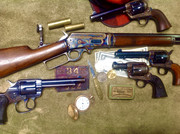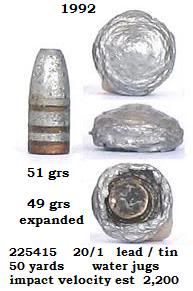[u]The Bullet Works[/u] wrote:Let's talk bullet lead alloy. Most bullet companies use the common bullet mixture of 2% Sn(tin) 6% Sb (antimony) and 92% Pb (lead). The Bullet Works chose to use a different mixture of 2%Sn (tin) 8%Sb(antimony) and 90%Pb (lead) in order to get a special mixture. The Bullet Works has contracted with a lead smelter to make this mixture for the company. In order to get this mixture it has to be purchased in either 10 or 20 thousand pound lots. The big lots allow the bullet alloy to be controlled very closely for the highest quality possible. In all bullet alloys the more tin and antimony in the lead , the better the bullets! Antimony is powdered and does not melt at normal lead melting temperatures, so it needs a medium to allow it to mix or homogenize with the lead. The tin and lead mix very well and the tin allows the antimony to stay homogenized in the molten lead mixture in the bullet mold. The only problem is, Antimony runs over $8 a pound and Tin is $8 a pound as well. Alloying these two expensive metals with lead quickly raises the cost of the bullets therefore most companies choose to use the cheaper alloy. The 2% 8% 90% alloy that the Bullet Works has chosen does cost more and takes more time to cast, but yields a much harder, tougher bullet. This is easier on the barrel and eliminates barrel leading normally associated with lead bullets. The hard tough bullet alloy is better for taking steel targets down because the lead bullet is tough and stays together longer. The Bullet Works is using Magma Bullet Lube which is put in at 120 degrees temperature and with 60 psi air pressure to assure the lube is in the groove when the bullet is loaded. You will find that all bullets sold by The Bullet Works are resized by pushing them through the resizer by the base instead of the nose. This is to keep the base concentric with the sides for the most accurate bullet possible. All Pistol bullets sold by The Bullet Works are bevel base which allows them to be loaded with less chance of shaving the sides of the bullet which robs accuracy. It is the endeavor of The Bullets Works to deliver the very best bullets to the shooter at a very competitive price. If you will notice we only sell in larger quantities trying to keep the price competitive .
I tend to believe this comment:[u]Missouri Bullets[/u] wrote:Most cast bullet shooters don't know a lot about the properties of the lead alloy they're shooting because they haven't been educated about it. If you want to learn a little bit about some important cast bullet facts, then please read on.
A common conception is that when it comes to lead bullets, harder lead equals less leading. This is a false perception! To explain this surprising statement, it is necessary to discuss the physics of getting the bullet out of the barrel and how lead residue comes to be deposted in the bore. When the powder charge ignites, pressure is generated. This pressure is measured in “copper units of pressure” (CUPS) and expressed in thousand of pounds per square inch. The heavier the powder charge, the greater the CUPS. Naturally, the purpose of generating pressure in the cartridge case is to force the bullet out of the case mouth and on down the barrel.
Lead is a soft metal. Its hardness is expressed on a standard scale, called the Brinell Hardness Number (BHN.) The BHN of the bullet interacts with the pressure generated by the burning powder. The mechanism of this involves the effect of the generation of thousands of pounds per square inch of pressure which causes the base of the bullet to expand, or “obturate”. Properly obturated, the base will have expanded beyond its original diameter which has the effect of “sealing the bore” against the explosive pressure of the gases burning behind it. Properly sealed, and working in conjunction with the lubricant in the lube groove, the bullet will thus not allow gases to escape forward from around the base of the bullets, which prevents it from shaving lead from the bullet body and forcing it into the bore grooves (otherwise known as “leading”.)
This failure to obturate (“seal the bore against onrushing gases”) causes leading which is a chore to clean and is a major obstacle to accuracy.
Missouri Bullets goes on to explain their rationale:[b]Buffalo Bore[/b] wrote:Many gun owners refer to hard cast bullets as 'lead' bullets. In most cases, they do not understand the drastic differences or they would not use such an inaccurate generalization. This generalization is as inaccurate a generalization as referring to all motorized vehicles as Volkswagens.
Hard cast bullets may contain some lead and be grey in color, but that is where the similarities stop. Hard cast bullets can be formulated of numerous alloy mixes (antimony, silver, tin, etc) containing some lead, but the alloys make the bullet much harder than pure lead. Pure lead has a Brinell hardness # of about 4. Most hard cast bullets will have a Brinell hardness # of 11 to 30 and as such are several times harder than lead.
Generally speaking, a properly designed, sized and lubed hard cast bullet will not leave lead alloy deposits in a rifled barrel, but pure lead bullets will almost always foul a barrel to the point of a total loss of accuracy (with very few rounds fired) and perhaps to the point that the barrel will split or worse. ( see my essay on 'Dangerous Pure Lead Cowboy Ammunition' ) I am employing many abstractions here, as there are a number of ways to make a hard cast bullet foul your barrel and make a pure lead bullet not foul, but on the whole, what I have written in this paragraph is accurate.
[u]Missouri Bullets[/u] wrote:Lead is a soft metal. Its hardness is expressed on a standard scale, called the Brinell Hardness Number (BHN.) The BHN of the bullet interacts with the pressure generated by the burning powder. The mechanism of this involves the effect of the generation of thousands of pounds per square inch of pressure which causes the base of the bullet to expand, or “obturate”. Properly obturated, the base will have expanded beyond its original diameter which has the effect of “sealing the bore” against the explosive pressure of the gases burning behind it. Properly sealed, and working in conjunction with the lubricant in the lube groove, the bullet will thus not allow gases to escape forward from around the base of the bullets, which prevents it from shaving lead from the bullet body and forcing it into the bore grooves (otherwise known as “leading”.)
This failure to obturate (“seal the bore against onrushing gases”) causes leading which is a chore to clean and is a major obstacle to accuracy.
An optimally hard lead bullet is simply one which obturates at a given pressure sufficiently to seal the bore against the gases which would otherwise “cut through” the soft lead (called “gas-cutting”, forcing molten lead into your rifling. A bullet which is too hard won't obturate and seal the bore, because the gas pressure is insufficient to expand the base of the bullet. A bullet which is too soft at a given pressure will experience excessive base expansion and vaporization of the lead, causing leading.
There is a formula for optimal bullet hardness which is simple and it is worth knowing:
Optimum BHN = CUPS / (1422 x .90)
The CUPS of your reloads is published in the reloading manuals. Take a typical .45 ACP load, using a 200-grain LSWC bullet – 5.0 grains of Bullseye. This load develops 900 FPS and is in common use among IPSC and IDPA gunners. The reloading manual shows that the pressure generated by this load is 20,000 CUPS. So, the formula for optimal bullet hardness is
20,000 / 1279.8 = 15.62
There it is! For this application – shooting a 200-grain LSWC at 900 FPS requires that you use a bullet with a BHN of 16 to 18 (round upwards a couple of BHN points for flexibility.)
You may be asking why shooters don't know much about this whole bullet hardness optimization business. The reason is basically that the large manufacturers, for ease of production, use a standard alloy for all of their cast bullet construction, an alloy which has a Brinell Hardness Number of approximately 24. Why do they do this? It's simple – one standard alloy simplifies logistics for the big manufacturers and, equally importantly, a bullet this hard ships well by standing up to getting dinged around during transportation. The fact that their bullets are too hard and cause leading and aren't very accurate because of improper obturation is something they'd really rather you weren't aware of. This explains why neither their packaging nor product information will ever refer to the BHN of their products.
Along those lines, how many boxes of cast bullets – from any source – state the BHN on them?
At the Missouri Bullet Company, we optimize bullets for your intended application. We don't take a “one size fits all” approach to manufacturing your bullets. We work with certified analysis foundry alloy in two hardnesses in order to provide you with the bullet hardness that works best for you. One is 2% tin, 6% antimony, balance lead for harder bullets at 18 BHN and the other is 1.3% tin, 4% antimony, balance lead. While it is expensive for us to maintain a dual supply of alloy, the payoff is in the fact that we can offer you a choice of bullet hardness.


